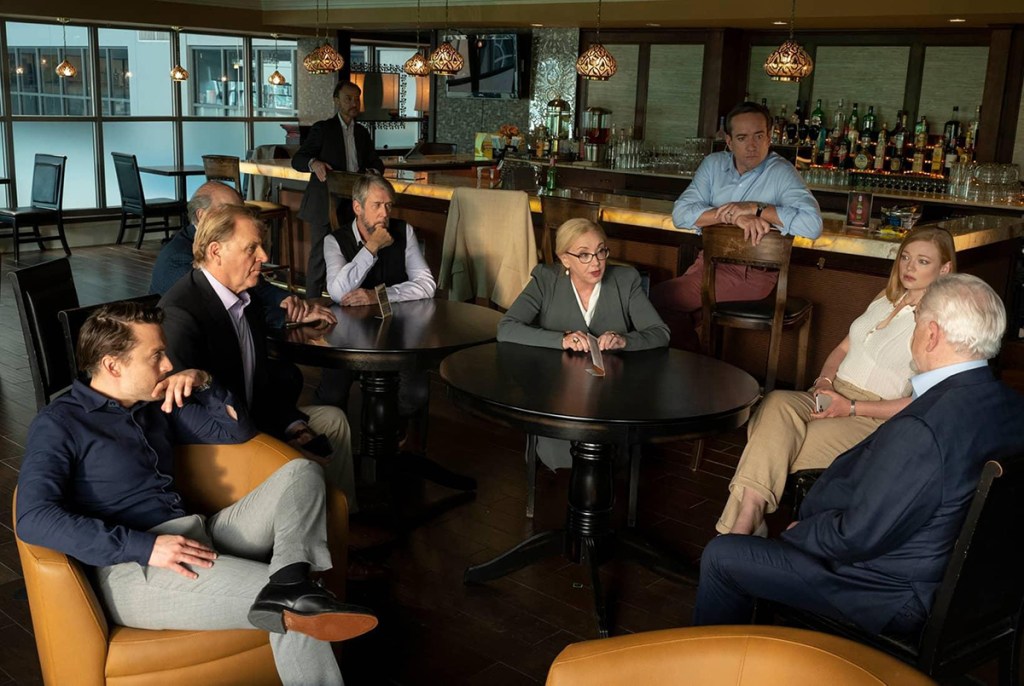At one point in an early Simpsons, Homer comes across an old issue of TV Guide, and finds the listing for the sitcom Gomer Pyle, U.S.M.C. “Gomer upsets Sergeant Carter,” he reads — adding with a fond chuckle, “I’ll never forget that episode.” Even for viewers unfamiliar with the show, the joke is clear: that’s what happens in every episode.
Sad to say, this popped into my head while watching the first in the new series of Succession. The acting, script and direction are as brilliant as ever. Nonetheless, once Logan Roy began yet again to dangle the possibility of becoming the next CEO of his media empire before his rivalrous offspring, it was hard not to wonder if the iron law of diminishing returns might be in the process of claiming its latest victim.
The episode picked up the story just after the series two cliffhanger: instead of taking his pre-arranged fall for the cover-up of sexual abuse on the company’s cruise ships, Logan’s son Kendall had used a press conference to place the blame squarely on his old dad. Now, having refreshed himself with a brief breakdown, Kendall is making a bid (yes, another one) to take over the business.
Not, needless to say, that Logan is taking this lying down, threatening — give or take a few expletives — to ‘grind Kendall’s bones’. Meanwhile, he’ll step down as CEO and give the job to, well, someone else. Cue the traditional jostling for position among the traditional candidates.
Every individual scene was perfectly put together. Jeremy Strong is still miraculously good at simultaneously conveying — by the use of eyes alone — Kendall’s effortful belief that he can topple his father and his underlying fear that he can’t. Brian Cox’s Logan continues to radiate power, properly scary menace and, somewhere deep in the mix, a genuine if twisted love for his variously messed-up children.
Above all, Jesse Armstrong’s writing retains its ability to mix comedy, crunching family drama and an alarmingly persuasive picture of how the world really works — and all in such a way that they reinforce rather than ever undermine each other.
The perhaps inescapable trouble, though, is not only that the plotting is starting to seem like a theme with not quite enough variations. It’s also that while that picture of the world once felt revelatory, now that we’ve had the revelations, much of the shock value is lost.
Granted, it’s a long-standing rule of television that what you do with a much-loved and critically acclaimed program is to keep making it. But, as Succession (like The West Wing and Killing Eve before it) is beginning to suggest, the rule isn’t necessarily a wise one.
I’m certainly going to keep watching series three: partly because below-par Succession is still well-above-par TV; but mostly in the hope that I’ll be proved wrong and that it can find a direction that rekindles our old sense of awed admiration. Even so, the uncomfortable sense remains that the opening installment was a highly polished exercise in treading water.
After tackling O.J. Simpson and the killing of Gianni Versace, the latest American Crime Story has turned to a less murderous offense with Impeachment, a 10-part drama about the Monica Lewinsky affair that features Lewinsky herself among the producers. As played by Beanie Feldstein, she was first seen here in January 1998 emanating youth and sweetness as she prepared to meet her supposed friend and confidant Linda Tripp at the mall. But when she arrived she was met by the FBI agents Tripp had tipped off. As the scales fell from her over-trusting eyes, Monica asked that Tripp stay for the subsequent interview, so “that treacherous bitch can see what she’s done to me.” And from there, the episode flashed back over several years to prove just how accurate that description of Tripp was, with her emerging firmly as the villain of the piece.
American Crime Story, then, has another great tale to tell — but unlike in the previous series, it doesn’t seem sure how to tell it. Most obviously, the tone is all over the place. Poor old Paula Jones, for instance, was played almost entirely for laughs as she explained how Bill Clinton as governor of Arkansas had invited her to his hotel room and “pulled his business right out in the air.” Less jolly was the sheer malevolent glee with which the program piled up the indignities suffered by Tripp, who died last year — a glee it was annoyingly difficult not to share.
As for Monica, she falls somewhere between the comically and the tragically naive. Of course, some programs (Succession, for one) might have managed to fuse the two things into a convincing whole. So far, however, Impeachment merely shuttles uneasily between them.
This article was originally published in The Spectator’s UK magazine. Subscribe to the World edition here.

























